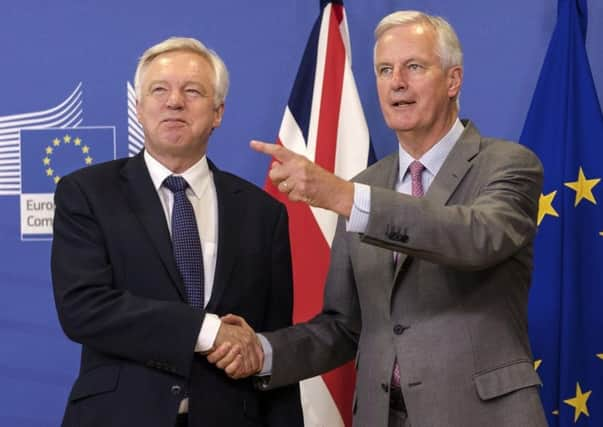'˜Brexit can be boring but the outcome could be a dramatic hit to Britain's wealth'


One problem is that any trade negotiation is bound to be detailed and complicated – as anyone could have told the Leave campaign when they promised that this would all be easy.
Negotiations become even more complicated when security considerations come into play, like the management of the Irish border or how to maintain co-operation with police forces and intelligence services across the European continent.
Advertisement
Hide AdAdvertisement
Hide AdThe Government has now admitted, in one of the papers it published last month, that defence and foreign policy co-operation within the EU has also been valuable to the UK and that it wants to find some way to continue that after it leaves. But the biggest problem is within the Conservative party itself. That is why we have heard contradictory statements from Ministers.
The Leave campaign united around reasserting British sovereignty, but they gave little thought to what that meant, or what continuing relations we would have with our neighbours if we left what has been the institutional framework for a broad partnership for 44 years.
Foreign Secretary Boris Johnson assured us that other EU countries would give us what we wanted; but he does not seem to know, even now, what exactly he does want.
David Davis, the Brexit Secretary, repeatedly said that economic interests would push the Germans to yield to British demands, even though he insisted that for us political arguments were more important.
Advertisement
Hide AdAdvertisement
Hide AdBefore and since the referendum, a number of impossible promises have been made. We cannot have ‘frictionless trade’ across borders if we leave the EU customs union. Ministers have looked at the Norwegian-Swedish border, the Canadian-US border and others; the talk is of needing to recruit 5,000 more border guards, of computer systems becoming overloaded, and of lorry parks to be built, unlikely to be ready by March 2019. Liam Fox, the International Trade Secretary, still insists that the United States will give us a free trade agreement, even after Washington imposed 200 per cent tariffs on Bombardier.
The Government has lost a lot of time, partly because of the unnecessary election, but much more because Ministers disagree on so many issues. Key Cabinet committees have met infrequently; officials and some junior Ministers have resigned in frustration.
The EU Withdrawal Bill, the key legislative aspect of Brexit, has been delayed by a month after Conservative MPs as well as others put down a list of amendments; it’s unlikely to emerge from Parliament until after Easter next year. Close observers say that many Ministers are demoralised by attempting to put through changes which they fear may prove damaging or unworkable. Ministers who campaigned to ‘restore Parliamentary sovereignty’ are now trying to avoid Parliamentary votes.
Meanwhile, businesses are making plans. Major banks in London have already leased office space in other European capitals. The Times has run a series of articles on the advantages of moving to Paris, Frankfurt, Dublin or Luxembourg.
Advertisement
Hide AdAdvertisement
Hide AdThe president of Toyota has warned that a hard Brexit will make his company reconsider the future of its British assembly plant; other companies are quietly discussing moving staff and operations to the continent.
None of this can be surprising to Ministers; business representatives have been telling ministers and opposition politicians what they would have to do in the event of uncertainty and delay for the past year. Company and bank HQs leaving Britain will shrink tax revenues, compounding the blows to the economy and our standard of living caused by the sharp fall in the value of the pound. Remember the promises that no-one would be poorer if we left the EU? We’re already discovering that was pie in the sky.
The hardest supporters of Brexit now hope that negotiations on a future relationship will break down, leading to a ‘clean break’ in 2019. That horrifies their colleagues, who understand that without co-operation with governments across the Channel the movement of people, goods and information will falter, and the British economy will take a hit.
Each month that the Government hesitates, asking the EU to propose solutions but unable to propose coherent packages ourselves, we move closer to the cliff-edge of March 2019. Yes, the detail of these negotiations is dreadfully boring. But the outcome could seriously damage our national wealth.